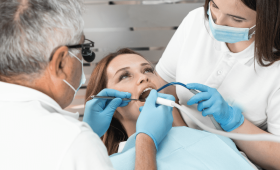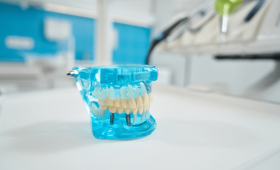What are the Main Factors Affecting Dental Implant Prices in Hamburg?
Dental implant prices in Hamburg vary greatly depending on many factors. One of the most significant factors is the quality and origin of the implant brand used. For example, premium Swiss or German brands like Straumann or Nobel Biocare are more expensive than more affordable local or Asian-origin brands.
In addition, the complexity of the treatment has a major impact on the price. The need for additional surgical procedures (bone grafting, sinus lift) in cases of full-mouth restoration instead of a single implant or bone deficiency significantly increases the total cost. The clinic’s location, the dentist’s level of expertise, and experience are also decisive in pricing.
What is the Average Cost of a Single Dental Implant in Hamburg?
The average cost of a single dental implant in Hamburg varies depending on the brand used and the clinic’s pricing policy, but it generally has a price range of 2,000 Euro to 4,000 Euro. This price usually includes the implant itself and the surgical placement procedure.
However, the abutment (connector part) and crown (dental veneer) that will be placed on it may not be included in this price, which increases the total cost. Some clinics offer package prices, while others charge for each stage separately. Therefore, it is vital to get a written price quote that includes all expenses before starting the treatment.
How Do Dental Implant Prices in Hamburg Compare to Other Cities in Germany?
As Hamburg is one of Germany’s largest and wealthiest cities, dental implant prices are generally higher than in other parts of the country. Prices may be similar to or slightly higher than those in the capital, Berlin. In smaller cities or rural areas, prices may be more affordable as clinics have lower operational costs. The differences in prices across Germany are also related to factors such as the quality of service, the technology used, and the experience of the dentist. However, Hamburg is an attractive option for those seeking high-quality service.
Why Are Dental Implant Prices So High in Germany?
The main reasons for the high dental implant prices in Germany include high living and operational costs. The rent for the clinic, staff salaries, state-of-the-art equipment used, and high-quality materials are directly reflected in the prices. Furthermore, dental education and professional standards in Germany are very high, which makes the services of experienced specialists more valuable. Strict legal regulations and high taxes also contribute to the costs.
How Do Dental Implant Costs in Germany Compare to Turkey?
Dental implant costs in Germany are generally 3 to 5 times higher than the costs in Turkey. Turkey’s biggest advantage is that the exchange rates are more favorable for foreign patients and labor costs are lower. Although both countries offer high-quality and modern services, the high standards and materials used in Germany explain the price difference. However, this does not mean that the quality of treatments in Turkey is low.
What Are the Most Popular Dental Implant Brands in Germany?
Dentists in Germany generally prefer implant brands that have proven their quality and reliability internationally. The most frequently used brands include German-based Camlog, Dentsply Sirona, and Swiss-based Straumann and Nobel Biocare. These brands have high success rates supported by many years of clinical research. These brands stand out for patients seeking a reliable and permanent solution.
Is Dental Implant Surgery a Painful Procedure?
Dental implant surgery is a painless procedure as it is performed under local anesthesia. The patient does not feel any pain or discomfort during the procedure. A slight pain or swelling may occur for a few days after the operation, but this can usually be controlled with simple painkillers and passes quickly. Most patients find the implant operation even less painful than a tooth extraction. Your dentist will provide you with all the necessary information to make your post-treatment process comfortable.
How Long Does the Total Duration of Dental Implant Treatment Take?
Dental implant treatment is generally a two-stage process and can take several months in total. In the first stage, the implant is surgically placed in the jawbone, and a healing period of 3 to 6 months is expected for the implant to fuse with the bone. This process is called osseointegration and may vary depending on the patient’s general health and bone quality. In the second stage, the treatment is completed by placing the abutment and prosthetic crown on the implant.
What Is the Success Rate of Dental Implant Treatment in Germany?
The success rate of dental implant treatment in Germany is quite high, thanks to high standards and modern technologies. When experienced dentists and quality implant brands are used, the success rate can exceed 95%. Factors affecting success include the patient’s general health, oral hygiene, smoking and alcohol habits, and the bone density of the area where the implant is placed. Therefore, a correct evaluation and planning process are of great importance.

What Is Full-Mouth Implant Treatment and What Is Its Cost?
Full-mouth implant treatment is usually offered with concepts such as “All-on-4” or “All-on-6”. In these treatments, four or six implants are used to place a fixed prosthesis on the jawbone of a patient who is missing all their teeth. The cost of a full-mouth implant treatment in Germany can range from 15,000 Euro to 30,000 Euro, depending on the number of implants, the brand, and the type of prosthesis. This cost may vary depending on the patient’s specific condition and treatment plan and can often include additional costs (such as a temporary prosthesis).
Are Bone Grafting and Sinus Lift Procedures Necessary and How Do They Affect the Cost?
Additional procedures such as bone grafting or sinus lifting may become mandatory for patients who do not have sufficient bone volume for implant placement. These additional surgical procedures increase the complexity and duration of the treatment, which significantly increases the total cost. The cost of bone grafting varies depending on the material used (synthetic, animal-derived, or taken from the patient’s own bone) and the size of the procedure. Such additional procedures must be taken into account when planning the total treatment budget.
Does Insurance Cover Dental Implants in Germany?
In Germany, public health insurance (GKV) generally does not cover the cost of dental implants or only finances a very small part of it. For patients with private health insurance (PKV), the situation varies according to the insurance policy. Some private insurances may cover a certain percentage or the entire cost of the implant. Usually, insurance provides support if it considers the implant as a medical necessity rather than an aesthetic procedure. It is important to contact your insurance company before starting the treatment to find out the scope of your policy.
What Is the Difference Between a “Zahnarzt” and an “Oralchirurg” in Germany?
In Germany, dental implant treatment is usually undertaken by two different specialists: “Zahnarzt” (general dentist) and “Oralchirurg” (oral and maxillofacial surgeon). An Oralchirurg is a doctor who has received additional specialized training in oral, dental, and maxillofacial surgery. Complex cases, situations requiring the placement of more than one implant, or additional surgical procedures like bone grafting are usually performed by an Oralchirurg. In simple cases, an experienced Zahnarzt can also place an implant.
How to Find a Good Dental Clinic in Hamburg?
You can follow several methods to find a good dental clinic in Hamburg. First, you can search for licensed dentists on the websites of the German Dental Association (KZBV) or the local dental chamber. In addition, online patient reviews, clinic websites, and social media accounts can also guide you. The best approach is to make a decision by considering factors such as the dentist’s experience, the clinic’s hygiene standards, the technology used, and patient communication.
What Are the Post-Dental Implant Care Instructions?
After dental implant surgery, you need to follow some care instructions to speed up the healing process and reduce the risk of infection. For the first few days after the surgery, you should eat soft foods and avoid very hot or cold drinks. You should pay attention to your oral hygiene as recommended by your dentist and gently clean the area around the implant. It is important to stay away from habits such as smoking and alcohol consumption as they negatively affect the healing process.
What Is the Lifespan of Dental Implants?
When applied correctly and with proper oral hygiene, dental implants can be used for a lifetime. Scientific studies show that the ten-year success rates of dental implants are over 95%. Regular brushing, flossing, and going to the dentist for a check-up every six months are of great importance to extend the life of the implant. The choice of a quality implant and an experienced dentist also extends this lifespan.
What Materials Are Used in Implant Treatment?
The most common material used in dental implant treatment is titanium, a biocompatible metal that is easily accepted by the human body. Titanium permanently integrates with the jawbone, making the implant long-lasting and stable. In addition to titanium, zirconium implants, which offer an appearance closer to the natural tooth color, are also preferred for patients with aesthetic concerns or metal allergies. Zirconium implants are generally more expensive.
What Financing Options Are Available for Patients?
Since dental implant treatment can be quite costly in Germany, many clinics offer various financing options to patients. In addition to standard payment methods such as credit cards and bank transfers, clinics can often help patients with installment payment plans or special health loans. These options make the cost of treatment more accessible and reduce the financial burden. It is useful to learn about your clinic’s policies on this matter in advance.
Do Dentists in Hamburg Speak English?
As Hamburg is an international business and tourism hub, many dental clinics serve international patients. Therefore, the dentists and staff working in the clinic generally speak English well. This provides ease of communication for English-speaking patients and makes the treatment process more comfortable. It is important to confirm the language of communication before the treatment.
How Does the Process Work for Patients from Abroad?
For patients from abroad, the process usually starts with an online consultation or a phone call. The patient sends their dental X-rays and intraoral photos to the clinic. Based on this information, the dentist prepares a preliminary treatment plan and a price quote. If the patient accepts, the travel plan is made, and the in-person examination and treatment process begin at the first appointment. These clinics usually provide support with arranging appointments, accommodation, and transfers.
Are German Dental Clinics’ Hygiene Standards High?
Dental clinics in Germany are subject to very strict legal regulations regarding hygiene and sanitation. It is mandatory for all clinics to maintain the highest hygiene standards and comply with infection control protocols. Instruments are regularly sterilized, single-use materials are preferred, and all surgical procedures are performed in sterile environments. This provides a safe treatment environment for patients.
What Are the Possible Risks and Complications of Dental Implant Treatment?
Although dental implant treatment generally has a high success rate, it can carry some risks and complications, as with any surgical procedure. These include infection, nerve damage (rarely numbness in the lip or tongue), the implant not fusing with the bone, and post-operative swelling or bruising. However, these risks are minimized by an experienced dentist using modern techniques.
Can a Temporary Prosthesis Be Placed During the Healing Process?
Yes, a temporary prosthesis can be placed during the dental implant’s healing process to address aesthetic and functional concerns. This temporary prosthesis is specially designed not to put pressure on the area where the implant is placed and allows the patient to continue their normal life. The temporary prosthesis is replaced with a permanent crown after the implant has fully integrated with the bone.
What Happens If a Dental Implant Fails?
Dental implant failure is a rare condition and usually occurs due to the bone not accepting the implant or an infection. If the implant fails, it is removed by the dentist, and a new implant can be placed after the healing process is complete. Reliable clinics offer a warranty or revision treatment for such situations. It is important to learn the conditions of these guarantees in advance.

What Are Patient Rights in Germany?
Patient rights in Germany are strictly protected by health care laws. Patients have the right to be fully informed about the treatment process, get a second opinion, and refuse the treatment plan. Before starting the treatment, it is important to sign a contract or agreement stating all the conditions in writing to protect your rights.
What Technologies Are Used in Dental Implant Treatment?
In modern dental clinics, advanced technologies that make dental implant treatment safer and faster are used. These technologies include digital tomography (CBCT) used for implant planning, surgical guides created with 3D printers, laser technology, and computer-aided design and manufacturing (CAD/CAM) systems. These technologies increase the success rate by making both the diagnosis and the treatment process more precise.
Is It Cheaper to Get an Implant in Rural Germany?
Getting a dental implant in rural Germany is generally cheaper than in large cities like Hamburg or Munich. In rural areas, the operational costs of clinics, rents, and staff salaries are lower. This is reflected in the prices and offers a more economical option for patients. However, when researching clinics, it is important to consider quality, experience, and patient reviews.
How Is Cost Calculated? (All-Inclusive vs Separate Fees)
Cost calculation can vary from clinic to clinic. Some clinics offer “package prices” that cover everything, including the implant, abutment, and crown. Others bill each stage separately (implant placement, abutment placement, crown creation). Before starting the treatment, getting a written price quote that clearly shows all cost items will prevent you from encountering unexpected expenses.
What Is the Difference Between a Dental Implant and a Dental Bridge?
A dental implant is an artificial tooth root placed in the jawbone to replace a missing tooth. It provides a natural feel and function because it is integrated into the jawbone and does not harm adjacent teeth. A dental bridge, on the other hand, is a prosthesis placed on the adjacent teeth after they have been reduced to replace a missing tooth. Bridges can damage sound adjacent teeth because they require them to be ground down and cannot prevent bone loss in the jawbone. Implants are a more long-lasting and protective option.
How Often Is a Check-up Appointment Required?
Regular check-ups after dental implant treatment are vital for the health and longevity of the implant. Generally, a check-up appointment is recommended once or twice a year for the first few years. During these appointments, the dentist evaluates the condition of the implant and the surrounding tissues, detects possible problems at an early stage, and performs professional cleaning.
What Are the Patient Reviews of Dental Clinics in Hamburg Like?
Patient reviews of dental clinics in Hamburg are generally positive. Patients are satisfied with the professionalism of the dentists, the cleanliness of the clinics, and the use of state-of-the-art equipment. Despite the high prices, the quality and reliability of the service received are important factors that increase patient satisfaction. However, every patient experience is personal and can vary.
Is It Safe to Get a Dental Implant in Germany?
Getting a dental implant in Germany is extremely safe due to high medical standards and strict legal regulations. Implants are made of biocompatible materials that are easily accepted by the body. Working in sterile conditions and with modern equipment is of critical importance to minimize the risk of infection. Choosing a reliable and experienced dentist further reinforces this safety.
How Does the Treatment Plan and Billing Process Work?
Before starting the treatment, a comprehensive treatment plan is created with a detailed consultation with your dentist. This plan clearly states all the procedures to be done, the materials to be used, and the total cost. The billing process usually proceeds in stages; a separate payment plan can be created for each stage, such as implant placement, healing, and prosthesis placement. A reliable clinic presents all costs transparently and informs the patient about additional fees in advance.
Can I Get a Second Opinion Before Starting the Treatment?
Yes, getting a second opinion before starting dental implant treatment in Germany is a very common and recommended practice. By getting an opinion from a different dentist or clinic, you can evaluate the accuracy of the treatment plan offered to you and its alternatives. This ensures that the treatment is planned in the most accurate way and gives you more confidence.
What Is the Legal Framework for Dental Tourism in Germany?
While Germany does not have a specific legal framework for dental tourism, general health care and patient rights laws cover international patients as well. This guarantees that all patients receiving treatment in German clinics will receive the same high standards of service and that their rights will be protected. Before the treatment, it is important to sign a written contract with your clinic to protect your rights.


